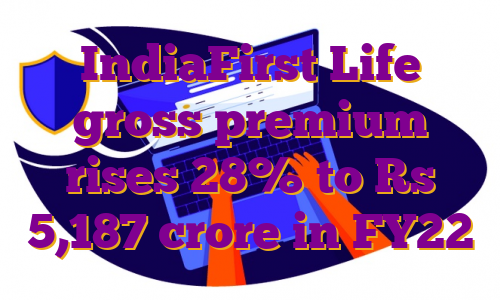IndiaFirst Life Insurance Company Ltd (IndiaFirst Life) on Friday said it registered a 28 per cent jump in its gross premium income to Rs 5,187 crore in the fiscal year ended in March 2022.
“Our gross premium has jumped 28 per cent from FY21 and crossed Rs 5,187 crore in FY22,” IndiaFirst Life said in a release.
The insurer said that it continued with its robust business expansion journey clocking a year-on-year growth rate of 50 per cent in terms of individual new business annual premium equivalent (NB-APE).
At Rs 1,345 crore of individual NB-APE, the company is the fastest-growing private life insurer in the country, IndiaFirst Life claimed.
The renewal premium income crossed Rs 2,400 crore for the first time ever since inception at Rs 2,420 crore, it said.
Among others, the life insurance company witnessed a 55 per cent jump in its individual new business premium at Rs 1,428.7 crore in 2021-22, from Rs 924 crore in 2020-21. The company’s 13th-month persistency ratio stood at 82 per cent at end of March 2022 as against 78.7 per cent by year ago same period.
The group credit life new business premium rose by 112 per cent to Rs 503.6 crore from Rs 238 crore.
The assets under management (AUM) rose by 11 per cent during the year to Rs 18,932 crore at end of March 2022 from Rs 17,109 crore, it added.
“Our robust business performance has ensured we continue to grow faster than the industry for the seventh consecutive year. In FY22, we registered a 50 per cent rise in individual NB-APE but what’s more heartening is the fact that we have a 7 years CAGR of 36 per cent,” Rushabh Gandhi, Deputy CEO, IndiaFirst Life Insurance Company said.
IndiaFirst Life’s current shareholders include Bank of Baroda, Union Bank of India, and Carmel Point Investments India Private Ltd (Warburg Pincus LLC group), holding 65 per cent, 9 per cent, and 26 per cent stakes respectively in the company.(Only the headline and picture of this report may have been reworked by the Business Standard staff; the rest of the content is auto-generated from a syndicated feed.)
 Dear Reader,
Dear Reader,
Business Standard has always strived hard to provide up-to-date information and commentary on developments that are of interest to you and have wider political and economic implications for the country and the world. Your encouragement and constant feedback on how to improve our offering have only made our resolve and commitment to these ideals stronger. Even during these difficult times arising out of Covid-19, we continue to remain committed to keeping you informed and updated with credible news, authoritative views and incisive commentary on topical issues of relevance.
We, however, have a request.
As we battle the economic impact of the pandemic, we need your support even more, so that we can continue to offer you more quality content. Our subscription model has seen an encouraging response from many of you, who have subscribed to our online content. More subscription to our online content can only help us achieve the goals of offering you even better and more relevant content. We believe in free, fair and credible journalism. Your support through more subscriptions can help us practise the journalism to which we are committed.
Support quality journalism and subscribe to Business Standard.
Digital Editor
!function(f,b,e,v,n,t,s){if(f.fbq)return;n=f.fbq=function(){n.callMethod?n.callMethod.apply(n,arguments):n.queue.push(arguments)};if(!f._fbq)f._fbq=n;n.push=n;n.loaded=!0;n.version=’2.0′;n.queue=[];t=b.createElement(e);t.async=!0;t.src=v;s=b.getElementsByTagName(e)[0];s.parentNode.insertBefore(t,s)}(window,document,’script’,’https://connect.facebook.net/en_US/fbevents.js’);fbq(‘init’,’550264998751686′);fbq(‘track’,’PageView’); .


